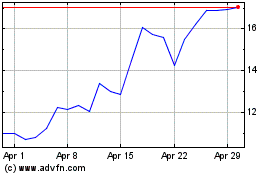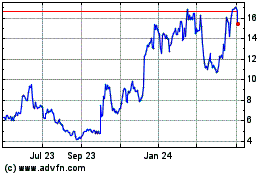ALX Oncology Announces First Patients Dosed with Evorpacept and Sarclisa As Part of Randomized Phase 1/2 UMBRELLA Study with Sanofi
04 September 2024 - 10:00PM

ALX Oncology Holdings Inc., (“ALX Oncology” or “the Company”)
(Nasdaq: ALXO), an immuno-oncology company developing therapies
that block the CD47 immune checkpoint pathway, announced the first
patients have been dosed in an arm of the randomized UMBRELLA phase
1/2 clinical study partnered with Sanofi that is
evaluating evorpacept in combination with SARCLISA®
(isatuximab-irfc). Evorpacept is ALX Oncology’s investigational
CD47-blocking therapeutic that uniquely combines a high-affinity
CD47-binding domain with an inactivated Fc domain and SARCLISA
is Sanofi’s approved CD38 monoclonal antibody in patients with
relapsed or refractory multiple myeloma (RRMM).
SARCLISA binds to a specific epitope on the CD38 receptor on
multiple myeloma (MM) cells, inducing distinct antitumor activity.
CD38 is highly and uniformly expressed on the surface of MM cells
and after first-line treatment, some relapsed or recurred patients
have shown resistance to CD38 agents. CD47 expression increases as
multiple myeloma progresses, suggesting that evorpacept may have
the potential to re-sensitize tumors to CD38 treatment or overcome
anti-CD38 resistance. This novel therapeutic combination has
demonstrated synergistic anti-tumor activity in preclinical
models.
“Multiple myeloma remains an incurable hematologic malignancy
for which there is significant need for innovation in new treatment
modalities to improve the clinical management of this disease,”
said Sophia Randolph, M.D., Ph.D., Chief Medical Officer at ALX
Oncology. “We are excited by the potential for the therapeutic
combination being evaluated in the UMBRELLA study, in collaboration
with Sanofi, to improve patient outcomes. This trial also
reinforces the significant potential of evorpacept to deepen
anti-cancer activity while maintaining a strong safety profile in
combination with a range of therapeutic regimens used to treat both
hematologic and solid cancers.”
Under the terms of the agreement, Sanofi will conduct the
multicenter, randomized, open-label, controlled, parallel-group
UMBRELLA phase 1/2 clinical study (NCT04643002) to evaluate the
safety, efficacy, pharmacokinetics and biomarker data of evorpacept
in combination with SARCLISA and dexamethasone in patients with
RRMM. Part 1 of the study is designed to evaluate the dosing of
evorpacept in combination with standard doses of SARCLISA and
dexamethasone to identify a recommended evorpacept dose. Part 2 is
designed to investigate the efficacy and safety of this three-drug
combination in an expanded population of patients with RRMM. ALX
Oncology will supply evorpacept and Sanofi will conduct the
clinical trial. ALX Oncology owns worldwide commercial rights to
evorpacept.
“Our current experience with SARCLISA suggests it may prove to
be an excellent combination partner for novel agents in
development,” said Peter C. Adamson, M.D., Global Head of Oncology
Development at Sanofi. “Therefore, we are pleased to share we have
started to enroll patients on this arm of our umbrella study. The
partnership with ALX Oncology is part of our strategic approach of
exploring potentially synergistic combinations to address
therapeutic challenges in patients with relapsed or refractory
multiple myeloma.”
About multiple myelomaMultiple myeloma (MM) is
the second most common hematologic malignancy, with more than
185,000 new diagnoses of MM worldwide annually (Globocan) and
over 35,000 new diagnoses in the United States each year (American
Cancer Society). Despite available treatments, MM remains an
incurable malignancy and is associated with significant patient
burden. Since MM does not have a cure, most patients will relapse.
Relapsed MM is the term for when the cancer returns after treatment
or a period of remission. Refractory MM refers to when the cancer
does not respond or no longer responds to therapy.
About ALX OncologyALX Oncology is a publicly
traded, clinical-stage immuno-oncology company focused on helping
patients fight cancer by developing therapies that block the CD47
immune checkpoint inhibitor and bridge the innate and adaptive
immune system. ALX Oncology’s lead product candidate, evorpacept,
is a CD47 blocking therapeutic that combines a high-affinity
CD47-binding domain with an inactivated, proprietary Fc domain. To
date, evorpacept has been dosed in over 500 subjects and has
demonstrated promising activity and favorable tolerability profile
across a range of hematologic and solid malignancies in combination
with various leading anti-cancer antibodies. ALX Oncology is
currently focusing on combining evorpacept with anti-cancer
antibodies, antibody-drug conjugates (ADCs), and PD-1/PD-L1 immune
checkpoint inhibitors.
Evorpacept’s unique profile: anchored by a rational
design and triple development pillarsRationally engineered
with an inactive Fc effector function, evorpacept’s clinical data
to date have demonstrated a substantially improved safety profile
over other anti-CD47 molecules in the clinic with an active Fc
(i.e., binding the Fc gamma receptor on macrophages). This
best-in-class safety profile allows for higher dosage with minimal
overlapping toxicity in the combination treatment setting. CD47
expressed on cancer cells binds to its receptor SIRP alpha, which
is predominantly expressed on two cell types: macrophages and
dendritic cells. The Company’s pipeline of therapeutic candidates
with standard-of-care agents include:
- Anti-cancer antibodies and ADCs (the
“don’t eat me” signal):
evorpacept enables Fc-mediated antibody-dependent phagocytosis by
macrophages in combination with anti-cancer antibodies (e.g.,
HERCEPTIN®) and ADCs (e.g., PADCEV® and ENHERTU®) with an active Fc
domain, which is otherwise impaired by CD47 expression on cancer
cells binding to SIRP alpha on macrophages. Additionally, ADCs
target the delivery of a chemotherapeutic payload to tumor cells to
exert cytotoxic effects.
- PD-1/PD-L1 immune checkpoint inhibitors (the
“don’t activate T-cells”
signal): evorpacept enables T-cell activation by dendritic
cells that are constitutively inhibited by CD47 expression on
cancer cells binding to SIRP alpha on dendritic cells. Activated
dendritic cells present neoantigens to T cells that once activated
will kill cancer cells when the PD-1/PD-L1 inhibitory interaction
is blocked by T-cell checkpoint inhibitors.
About SARCLISASARCLISA
(isatuximab-irfc) is a monoclonal antibody that binds to a specific
epitope on the CD38 receptor on MM cells, inducing distinct
antitumor activity. It is designed to work through multiple
mechanisms of action including programmed tumor cell death
(apoptosis) and immunomodulatory activity. CD38 is highly and
uniformly expressed on the surface of MM cells, making it a target
for antibody-based therapeutics such as SARCLISA. SARCLISA is
approved in more than 50 countries, including the US and the EU, in
combination with pomalidomide and dexamethasone for the treatment
of patients with RRMM who have received ≥2 prior therapies,
including lenalidomide and a proteasome inhibitor and who
progressed on last therapy. SARCLISA is also approved in 50
countries in combination with carfilzomib and dexamethasone,
including in the US for the treatment of patients with RRMM who
have received 1–3 prior lines of therapy and in the EU for patients
with MM who have received at least one prior therapy. SARCLISA
continues to be evaluated in multiple ongoing phase 3 clinical
studies in combination with current standard treatments across the
MM treatment continuum. It is also under investigation for the
treatment of other hematologic malignancies, and its safety and
efficacy have not been evaluated by any regulatory authority
outside of its approved indication.
Cautionary note regarding forward-looking
statementsThis press release contains forward-looking
statements that involve substantial risks and uncertainties.
Forward-looking statements include statements regarding future
results of operations and financial position, business strategy,
product candidates, planned preclinical studies and clinical
trials, results of clinical trials, research and development costs,
regulatory approvals, timing and likelihood of success, plans and
objects of management for future operations, as well as statements
regarding industry trends. Such forward-looking statements are
based on ALX Oncology’s beliefs and assumptions and on information
currently available to it on the date of this press release.
Forward-looking statements may involve known and unknown risks,
uncertainties and other factors that may cause ALX Oncology’s
actual results, performance or achievements to be materially
different from those expressed or implied by the forward-looking
statements. These and other risks are described more fully in ALX
Oncology’s filings with the Securities and Exchange Commission
(SEC), including ALX Oncology’s Annual Reports on Form 10-K,
Quarterly Reports on Form 10-Q and other documents ALX Oncology
files with the SEC from time to time. Except to the extent required
by law, ALX Oncology undertakes no obligation to update such
statements to reflect events that occur or circumstances that exist
after the date on which they were made.
Company Contact: Caitlyn Doherty, Manager, Corporate Communications, ALX Oncology, cdoherty@alxoncology.com, (650) 466-7125
Investor Contact: Malini Chatterjee, Ph.D., Blueprint Life Science Group, mchatterjee@bplifescience.com, (917) 330-4269
Media Contact: Audra Friis, Sam Brown, Inc., audrafriis@sambrown.com, (917) 519-9577
ALX Oncology (NASDAQ:ALXO)
Historical Stock Chart
From Dec 2024 to Jan 2025

ALX Oncology (NASDAQ:ALXO)
Historical Stock Chart
From Jan 2024 to Jan 2025
